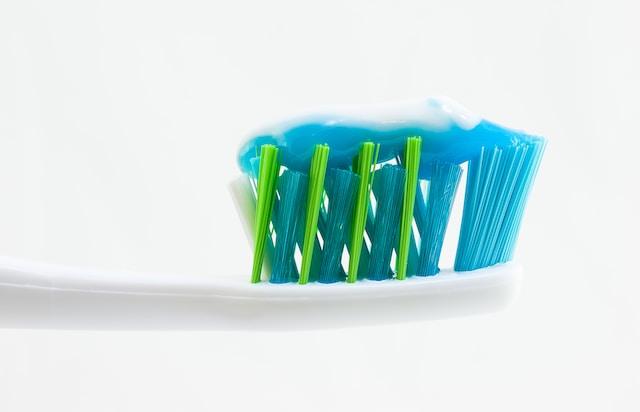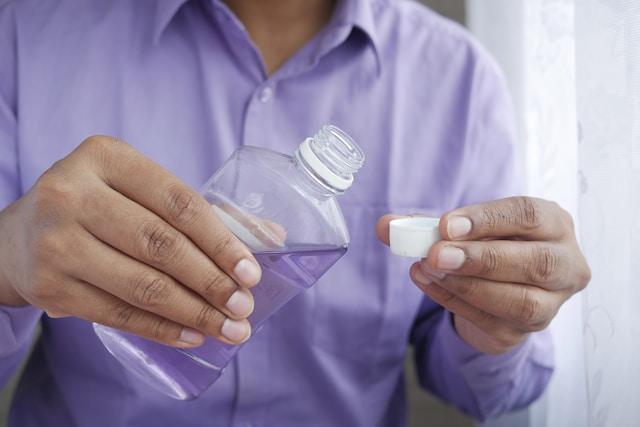Since the advent of toothpaste in the West, i.e. at the beginning of the last century, an industry perfectly orchestrated to send you to the dentist every week, poisoning you copiously, has gradually been built up.
Tout d’abord avec l’invention de Samuel Colgate, introduisant dès 1892 une sorte de crème à frotter sur les dents, vendue dans des tubes de peinture en étain qui permirent la première production de masse de dentifrice. Puis, avec l’ajout de recherches chimiques destinées à décaper l’émail dentaire pour donner une impression de propreté et de pureté.
Comment arrêter le dentifrice avec des solutions qui sauveront votre santé ?
Impression qui, s’accentuant au fil des décennies, mena les adeptes de cette nouvelle mode à une avalanche de problèmes pour les sphères ORL, gastrique et intestinale, donnant toute latence à des marques aventureuses, d’empoisonner les consommateurs en usant de promesses fallacieuses.
Aujourd’hui, plus de cent ans après son invention, 99,99% des marques mises sur le marché profitent des apparences d’un sourire à la blancheur si prisée que, pour vous faire croire n’importe quoi et ruiner insidieusement votre santé, elles sont prêtes à vous mentir… comme des arracheurs de dents.
Aujourd’hui, il est temps de mettre un terme à cette habitude archaïque.
Il est temps de vraiment vous préoccuper de l’essentiel, à savoir la santé de vos dents, de vos gencives, mais aussi de votre système ORL dans son intégralité.
Seven reasons why I stopped using toothpaste

Perhaps like you, until my knowledge allowed me to do so, I was a slave to this lack of alternatives, poisoning my chewing tools and neighboring organs in spite of myself.
And by the time I discovered the real danger of this bad habit, it was already too late.
Cariousprone to gum inflammation and literally tortured, by adolescence my teeth were falling out, dislocating, and willingly being pulled out by the dental mechanic to whom my family was accustomed.
There were a number of reasons for this massacre, which I've since updated in the light of modern compositions, in order to better understand and identify them.
Pourquoi arrêter le dentifrice : première raison
Le fluor, ingrédient miracle des années 80 vendant des dents de star hollywoodienne solides et saines, est un perturbateur endocrinien calcifiant la glande pinéale, et nuisant à la thyroïde comme aux surrénales.
It is highly probable that it is carcinogenic, unbalances the immune system and accelerates aging.
Arrêter le dentifrice, la deuxième raison
Le sulfate de sodium ou SLS est un épaississant permettant aux dentifrices de mousser généreusement. Cependant, en plus d’être cancérigène, le SLS :
- Scrubs the skin
- Harmful to the microbiota of the ENT sphere
- Pollutes the environment
- And intoxicates animals.
Highly volatile, it scatters sulfur compounds everywhere in its path.
What's particularly surprising is that many toothpastes contain it, even though it is notoriously harmful to gums and tooth enamel.
Troisième raison d'arrêter le dentifrice
Triclosanalso used in skin care products, deodorants, detergents, mattresses... is very often used in toothpastes.
However, it is a carcinogenic endocrine disruptor, acting very negatively on the thyroid gland and totally destabilizing the bacteriological balance in the mouth.
It also directly affects the fetus in pregnant women.
Arrêter le dentifrice : le propylène glycol est toxique
Le propylène glycol est une huile minérale issue de la fermentation de levures d’hydrates de carbone. On le retrouve dans les liquides de refroidissement et l’antigel, la peinture, les vernis, mais aussi comme agent tensioactif dans le dentifrice.
It is, of course, extremely toxic.
Arrêter le dentifrice pour rétablir la circulation des minéraux
Although of little concern in its own right, the problem caused by glycerin, even vegetable, lies in the fact that its adhesive power leaves such a sticky film on teeth that it takes dozens of rinses to completely remove it.
Qui plus est, les résidus de glycérine empêchent la circulation de minéraux comme le phosphore et le calcium, nécessaires à la protection des dents. Cette déminéralisation accélère la formation des caries et autres problèmes dentaires.
Sixième raison : Arrêter le dentifrice pour lutter contre les perturbateurs endocriniens
Diethanolamine or DEA, is an endocrine disruptor that can promote the development of cancer, particularly in the liver and kidneys.
Arrêter le dentifrice et évitez les nanoparticules
Microbeads of various types of plastic and chemical materials are used as abrasive agents in many toothpastes designed to whiten enamel by friction.
Although they have proven their ability to loosen plaque, they have an unfortunate tendency to hide in gum tissue, creating an avalanche of trouble as they absorb and expel the chemicals they encounter into the mouth.
Not to mention that these fashionable microbeads are often nanoparticulate.
Laboratory nanoparticles, also used in many additives, whiteners and disinfectants, are not only too small to be detected by the naked eye, they are also poorly identified in compositions.
Knowing that they can easily lodge in glial cells as well as other areas of the brain, and promote disorders of cognitive functions as well as vital organs...
Although these additives are found in both industrial and organic formulations, the little "extras" specific to the organic label are no more concerned about the health of your teeth.
Fructose or Xylitolfor example, are synthetic sugars.
Yet it's not hard to understand that sugar deposited on your teeth after brushing will cause cavities.
Xanthan gum or E415, although authorized for organic use, is a transgenic humectant not suitable for gluten-intolerant people, often derived from wheat, dairy products and soy, then coated with isopropyl alcohol.
Cellulose gum is a derivative of transgenic cotton known by the code E468. Although not authorized for organic use, you'll often see it added to pseudo-natural compositions to "stabilize" the ingredients present.
Or alcohol which, although used in the Middle Ages for cleaning teeth, has never produced any results other than caries, loosening of the teeth and degradation of the oral environment.
This list is unfortunately not exhaustive, which is why over the years, as the reasons accumulated one after the other, I decided to stop using any form of paste toothpaste.
Quelle alternative au dentifrice ? Une solution liquide naturelle et bio
After many problems, personal research, failed attempts, and a good dose of patience... I've finally found the ultimate solution.
A good dose oflocal, organic Scented Verbena hydrosol which, in addition to providing softness and freshness, is soothing, antibacterial and antioxidant. Perfectly suited to mucous membranes, it contains citrals that act specifically on oral inflammation.
From Bamboo Sprayis the central ingredient of this preparation, providing a host of virtues, including :
- A powerful anti-inflammatory effect
- Scientists have studied its antifungal capacity, which enables it to act on periodontitis.
- Fast clearance of oral candidiasis
- Immediate annihilation of bacteria and viruses present in the ENT sphere, while regulating the population of bacteria useful to the microbiota.
- Protection against bad breath
- Regeneration of the skin's inner lining, strengthening the quality of the microbiota
- Improved blood circulation to the mouth
- And, insofar as an infinitesimal dose can be absorbed at the time of brushing, a slight improvement in digestive disorders can be observed.
L’huile essentielle de Manuka sauvage qui, vingt fois plus puissante que l’HE de Tea tree :
- Removes germs, pathogens and bacteria, and its antifungal properties amplify the beneficial effects of Bamboo Spray against oral candidiasis and periodontitis.
- As well as a notable effect on abscesses, wounds and infections that can develop in this area.
A composition, I dare say, absolutely unique in the world and truly adapted not only to cleaning teeth and keeping gums healthy, but also to overall oral balance.
In other words, if you're still using toothpastes or dental "care" products that contain one of the seven pollutants listed in the introduction, or that aren't as effective as you'd hoped, you've got a unique opportunity to keep the dentist away from you and regain control of your gum health.
Le bain de bouche Biofloral aux plantes
En plus des raisons que nous venons d’évoquer, vous permettant de remplacer les pâtes et préparations dentaires, vous avez également la possibilité d’utiliser le bain de bouche fraicheur bio
To treat acute periodontitis, for example, it is perfectly suited to rinsing the mouth after each brushing. There's no need to rinse your mouth afterwards, as this would diminish the combined efficacy of the different ingredients.
You've got it right: a single bottle of HydroDent replaces a whole range of dental treatments, while being more effective and non-invasive.

HydroDent : Instructions for use
Taking advantage of the HydroDent benefits described in this article is simple.
Pour le brossage des dents : il vous suffit simplement de déposer directement sur votre brosse à dents 10 à 20 gouttes, que le système de dosage économique vous aidera à mesurer précisément. Ensuite, inutile de préciser qu’il convient de frotter soigneusement chaque zone.
The result is a fine, natural foam created by the friction movement, which promotes the correct distribution of the components listed above.
For mouthwashes : first rinse your teeth with clear water, or brush quickly to remove any food residues. This gesture, however simple, will ensure that the solution is more effective and, when used as a mouthwash, provides a more sustained therapeutic action.
To do this, pour the equivalent of one to two millilitres of HydroDent into a glass.
There's no need to dilute it with water, as it's already designed for an ideal balance, so you can immediately introduce the contents into your mouth and apply as much pressure between the teeth and/or on the area to be treated as required.
For a simple interview, thirty seconds to one minute will suffice, but in the case of disorders that have already set in, it may be necessary to extend this ritual for several minutes, from one to four times a day, depending on the severity of the disorders concerned.
After that, all you have to do is listen to your body, and it will speak to you.



